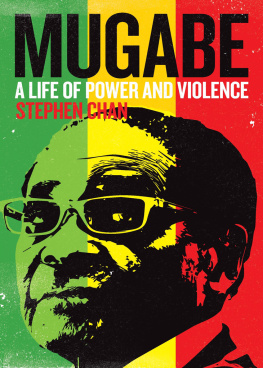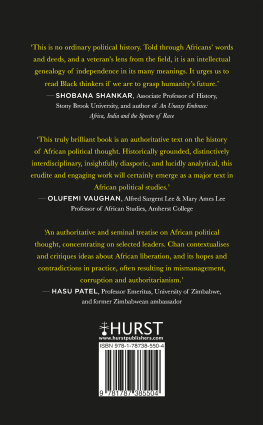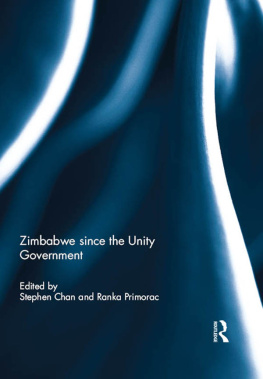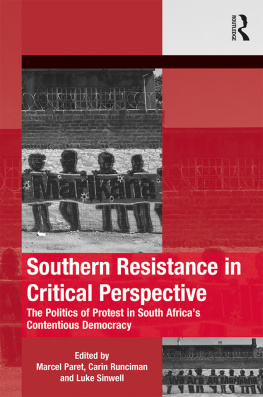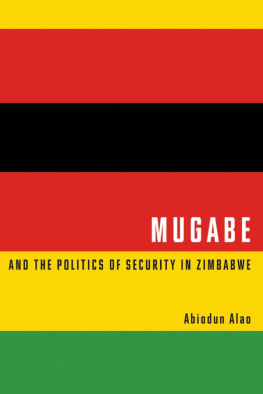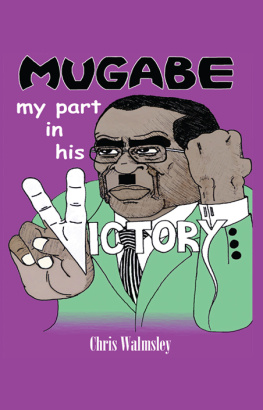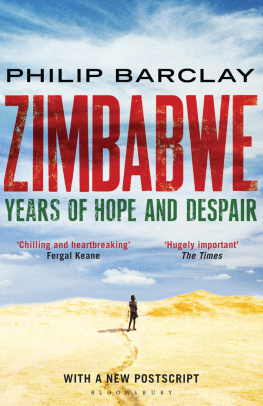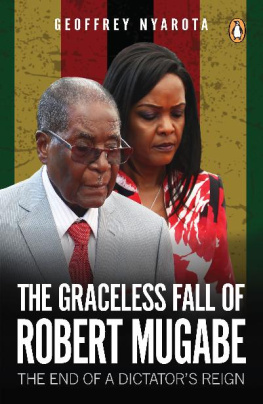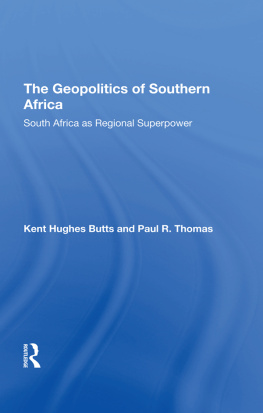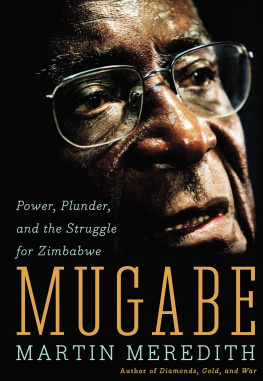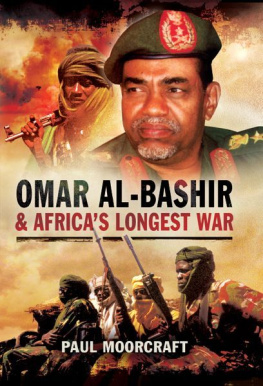Mugabe

New paperback edition published in 2019 by
I.B.Tauris & Co. Ltd
London New York
www.ibtauris.com
First published in hardback in 2003 by I.B.Tauris & Co. Ltd
Copyright Stephen Chan, 2003, 2019
The right of Stephen Chan to be identified as the author of this work has been asserted by the author in accordance with the Copyright, Designs and Patents Act 1988.
All rights reserved. Except for brief quotations in a review, this book, or any part thereof, may not be reproduced, stored in or introduced into a retrieval system, or transmitted, in any form or by any means, electronic, mechanical, photocopying, recording or otherwise, without the prior written permission of the publisher.
References to websites were correct at the time of writing.
ISBN: 978 178831 428 2
eISBN: 978 1 83860 886 6
ePDF: 978 1 83860 887 3
A full CIP record for this book is available from the British Library
Contents
On 24 November 2017, shortly after the army moved to depose Robert Mugabe, the following column appeared in the Zimbabwe Independent, written by the pseudonymous Muckracker and headlined with the title of this book, Robert Mugabe: A Life of Power and Violence.
Stephen Chan, who is very familiar with Zimbabwean politics and has written extensively on the country, in his book Robert Mugabe: A Life of Power and Violence, asks important questions.
Mugabe; was he a modern Africas Stalin or a patriot fighting to reverse the effects of colonialism and white domination? Chan sought not to demonise Mugabe, but to explain and interpret him in his role as a key player in Zimbabwe and Southern Africa.
In this masterly narrative, Mugabes character unfolds with the ebb and flow of triumph and crisis over decades of his rule. Mugabes story is Zimbabwes from the post-independence honeymoon of idealism and reconciliation, through electoral victory, successful intervention in the international politics of Southern Africa and resistance to South Africas policy of apartheid.
However, a darker picture emerged early into independence with fierce repression, the savage crushing of the opposition Zapu and its leader Joshua Nkomo, the elimination of political opponents, growing corruption, disastrous intervention in the Congo war, and all worsened by drought and the HIV and Aids crisis.
Here was a beleaguered president in the face of growing unrest resorting to increasingly desperate measures systematic repression, violence, crushing the opposition, seizing white-owned farms, muzzling the press and using fear as a political weapon.
Chans tightly argued and rigorous narrative, based on close personal knowledge of Zimbabwe, depicts the emergence of a ruthless and single-minded despot amassing and firmly clinging to his power.
It follows the triumphant nationalist leader, reconciling all in the new multi-racial Zimbabwe, degenerating into a petty tyrant consumed by hubris and self-righteousness facing an endgame of potentially horrifying dimensions. The end finally arrived on Tuesday afternoon when Mugabes rule came down crushing under the weight of a calculated military intervention.
It seemed that a book which was completed in 2002 and first published in 2003 has remained an important part of political discourse in Zimbabwe. Accordingly, it seemed fitting to contemplate an edition of the book after the fall of Mugabe and after the end of his capacity for power and violence. To the main text, which remains unchanged, an extended essay has been added, covering Mugabes life over the 15 years he ruled Zimbabwe since 2002. To the man who liked to consider himself the father of liberation came the riposte from his own colleagues that he had become so narrow-minded he had begun to devour his own children and had forgotten that the struggle for independence was to bring benefit to the people of Zimbabwe.
MOST COMMONLY USED ACRONYMS
| FRELIMO | Frente de Liberacao de Mocambique (Mozambican governmental party) |
| MDC | Movement for Democratic Change (recent opposition party to Mugabe) |
| RENAMO | Resistencia Nacional Mocambicana (rebel movement in Mozambique) |
| ZANLA | Zimbabwe African National Liberation Army (armed wing of Mugabes party) |
| ZANU | Zimbabwe African National Union (Mugabes party) |
| ZANU-PF | ZANU-Patriotic Front (coalition party formed from Mugabes and Nkomos) |
| ZAPU | Zimbabwe African Peoples Union (Nkomos party) |
| ZIPRA | Zimbabwe Peoples Revolutionary Party (armed wing of Nkomos party) |
| ZUM | Zimbabwe Unity Movement (opposition party led by Edgar Tekere in 1990) |
OTHER ACRONYMS
| ANC | African National Congress (anti-apartheid party; Nelson Mandelas party) |
| CIO | Central Intelligence Organisation (Zimbabwean secret police) |
| CODESRIA | Council for the Development of Social Science Research in Africa |
| IMF | International Monetary Fund |
| MMD | Movement for Multi-party Democracy (Zambia) |
| NAM | Non-Aligned Movement |
| NCA | National Constitutional Assembly (NGO consortium from which the MDC grew) |
| OAU | Organisation of African Unity |
| PAC | Pan-Africanist Congress (anti-apartheid party, South Africa) |
| PF | Patriotic Front (negotiating vehicle for Mugabe and Nkomo before independence) |
| SADCC | Southern African Development Coordination Conference |
| SAPES | Southern Africa Political Economy Series |
| UANC | United African National Council (Muzorewa party vehicle) |
| ZANU-Ndonga | (minority party of Ndabaningi Sithole) |
I was a member of the Commonwealth Secretariat from 1977 to 1983. I was not a senior member and I cannot claim to have been intimately involved in the diplomatic manoeuvres of Secretary General Sir Shridath Ramphal, either preceding or during the Lancaster House talks that were a prelude to Zimbabwes belated independence. Nevertheless, as a tangentially connected figure, I was in a position to observe and learn much that occurred during this period, and to attend meetings of the Commonwealth Committee on Southern Africa that sat in parallel session to the negotiations at Lancaster House. I have written about this elsewhere.
When, however, that Committee and the Lancaster House process both coincided on the need for a Commonwealth Observer Group to monitor the freeness and fairness of the election campaign and the elections that were to give independent Zimbabwe its first government, I was seconded to the staff of that group and, as a result, spent the best part of January to March 1980 in what was then officially Southern Rhodesia. I was part of that small detachment of staff members that arrived before the remainder of what was called the Groups Secretariat, and the Observer Group itself. In one week we had to establish an operational base and complete a reconnaissance of the country. This latter task fell to Peter Snelson and myself. I covered both the Matabelelands and Manicaland, and later, with Emmanuel Apea, headed the groups operations in Matabelelands North and South. I have also written about that time elsewhere, but it had a curious echo in 2000, when a beleaguered Robert Mugabe sanctioned the farm invasions by war veterans; watching BBC News 24 at the very beginning of the invasions, I saw a leader of the war veterans addressing his supporters, and recognised at once the street urchin I had hired to clean the vehicles of the Commonwealth Observer Group outside what was then the Southern Sun Hotel in Bulawayo. No veteran he, and no

